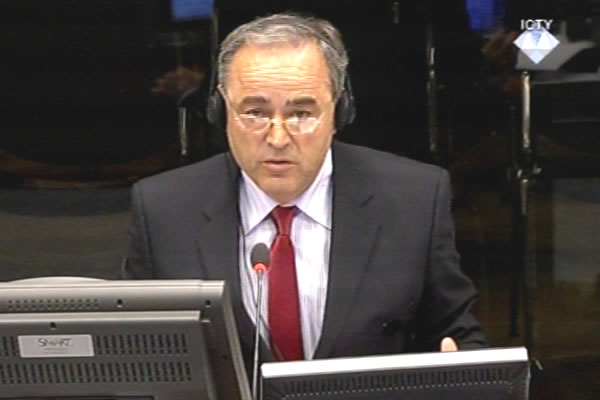Home
STEALING VW GOLF CARS MORE IMPORTANT THAN CRIMES AGAINST CIVILIANS
During the evidence of Dobrislav Planojevic, former assistant to the Bosnian Serb interior minister, the prosecutor showed that the investigation into the theft of VW Golfs from the Sarajevo TAS factory was much more detailed than any investigation of war crimes against non-Serb civilians in the territory under the control of the accused Radovan Karadzic
 Dobrislav Planojevic, defence witness of Radovan Karadzic
Dobrislav Planojevic, defence witness of Radovan Karadzic The professional career of Dobrislav Planojevic, police officer from Sarajevo, really took off during the war in BH. Before the war, he was the commander of the police station in Marijin Dvor; in the spring of 1992, he became the assistant to the Bosnian Serb interior minister Mico Stanisic. From September 1992 to the end of the war, Planojevic worked in the Republika Srpska State Security Service. After testifying in the Stanisic and Zupljanin case, Planojevic appeared at the trial of Radovan Karadzic. In both cases Planojevic’s status as the defense witness was made more difficult by the statement he gave to the OTP investigators in 2004, where he was treated as a suspect. In the statement, Planojevic tried to shift the blame on others, primarily on Minister Stanisic.
In his statement to Karadzic’s defense team the witness tried to portray the Bosnian Serb police as a professional organization that strove to investigate all crimes. Planojevic also highlighted a number of factors that made that process difficult: lack of professional staff, police officers frequently being deployed on the front lines, and bad working conditions caused by the war. At the time when he served as the assistant minister, Planojevic was in charge of crime prevention and detection.
In the cross-examination, prosecutor Sutherland showed several documents, including Minister Stanisic’s cable requesting that the MUP take part in the investigation of war crimes, particularly in cases involving Serb victims. This, the prosecution contends, prevented the investigations of cases where Muslims and Croats were victims. The witness didn’t agree with the suggestion. The prosecutor then contested Planojevic’s claim that it was difficult to perform police work during the war. The documents show that after VW Golf cars were stolen from the TAS factory in Sarajevo a detailed investigation was launched. Such an investigation was ‘never observed’ in any of the cases involving grave crimes against non-Serb civilians. ‘I wouldn’t agree’, the witness replied tersely.
So far in the trial, Karadzic has also used the purported disrupted communications between him and lower-ranking political, military and police entities as a defense. Planojevic also claimed that the communications within the police structure were often disrupted. This prompted the prosecutor to confront him with a MUP report that shows that in just a few months in 1992 more than 1,000 cables were exchanged in the police and that there were almost 10,000 radio calls. In response, the witness said he never claimed there were no communications: the problem was that they were often disrupted, especially in combat zones.
In a bid to prove that there was an atmosphere of impunity for crimes against civilians in Republika Srpska and that perpetrators were appointed to top posts, the prosecutor used Planojevic’s statement to the OTP investigators, where Planojevic said that Dusan Malovic’s unit provided security for minister Stanisic. Malovic was notorious for the crimes in Bijeljina. The witness partially repudiated his previous claims, saying that Malovic was part of the minister’s security detail on just one occasion. According to the prosecutor, the fact that Veselin Vlahovic Batko was never prosecuted for the crimes in Grbavica testifies to the atmosphere of impunity for crimes against civilians. The witness replied that he only knew that Vlahovic was arrested at one point in 1992 by the army. The witness didn’t know if Vlahovic was subsequently released or if he escaped.
Radovan Karadzic’s trial continues on Tuesday, 2 April 2013.
Linked Reports
- Case : Karadzic
- 2013-03-27 THE WITNESS WHO DIDN’T SEE ANYTHING
- 2013-03-26 KARADZIC’S ‘GOOD COP’
- 2013-03-26 WHAT TO DO WITH 23 BALIJAS
- 2013-04-02 RADOVAN KARADZIC WAS A ‘SUPERIOR BUT VULGAR INTELLECTUAL’
- 2013-04-02 GENERAL MILETIC WILL TESTIFY ONLY IF SUBPOENAED
- 2013-04-03 DAYTON WAS TAILORED TO BOLSTER WAR GAINS
